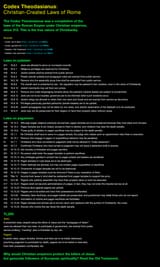Anonymous
6/18/2025, 3:15:15 AM No.17772543
What people don’t understand is that Paganism wasn’t a religion in the modern sense as it was more of a civic or cultural tradition than a belief system. It was ritual-based, not faith-based as you honored the gods through sacrifices and festivals, not through personal devotion or doctrine. It didn’t have a universal morality as the gods didn’t care how “good” you were, just that you made the right offerings. It was usually ethnic-based and didn’t have a missionary drive to convert others (hence why every ethnicity practically had their own mythology). It also had no “sacred texts” or central authority outside of state cults, which meant no unified resistance to Christianity’s spread or any way to preserve teachings and standardize beliefs.
Replies:

